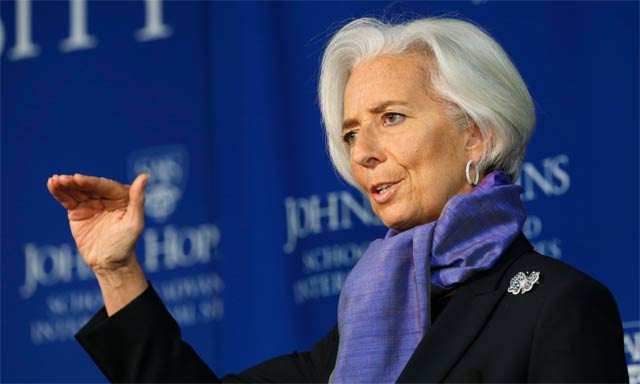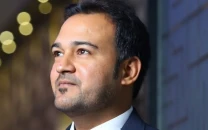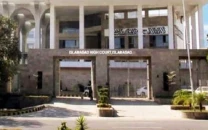IMF MD to visit Pakistan for first time in 10 years
Christine Lagarde is expected to discuss economic policies following end of $6.2b loan programme

Christine Lagarde is expected to discuss economic policies following end of $6.2b loan programme. PHOTO: REUTERS
IMF MD Christine Lagarde and Asian Development Bank President Takehiko Nakao would visit Pakistan next month, according to a statement issued by the Ministry of Finance on Monday.
IMF clears payment to Pakistan in 3-year programme
It will be for the first time in over 10 years when the head of the global lender will come to Pakistan. Lagarde is expected to arrive on October 23, almost a month after the end of IMF’s $6.2 billion three-year Extended Fund Facility for Pakistan.
On September 28, the IMF Executive Board is going to approve the last remaining loan tranche of about $102 million in addition to approving the 12th review of Pakistan’s economy for the period April-June 2016.
Even in the last review, the IMF board would have to ease some conditions for clearing the loan as the government has missed two key targets.
“Pakistan has invited the MD and she has provisionally accepted the invitation,” said Tokhir Mirzoev, IMF Resident Representative in Islamabad, while talking to The Express Tribune.
He said it was expected that she would have discussions with Pakistani authorities, business community and other stakeholders on economic policies for the country in particular and on global economy in general.
In September 2013, Pakistan obtained a three-year IMF package aimed at avoiding default on international debt repayments and introducing structural reforms in energy, taxation and fiscal areas.
At the end of the programme, the government has claimed victory. The finance ministry has said that the budget deficit has been lowered from 8.2% of gross domestic product (GDP) in 2013 to 4.6% by the end of fiscal year 2015-16, foreign currency reserves of the State Bank of Pakistan have increased to $18 billion and the economy has grown at a decent pace of 4.7%.
However, independent experts question these achievements as the government has abandoned the privatisation programme, could not address the energy sector circular debt and has failed to broaden the tax base.
Dr Hafiz Pasha, prominent economist and former finance minister, has highlighted how the government played with the data.
‘Pakistan headed towards another IMF bailout’
In a newspaper article, he pointed out that to claim that the budget deficit had been reduced to 4.6%, the government declared a Rs212-billion statistical discrepancy in last year’s fiscal accounts.
Over the last three years, the cumulative discrepancy was a colossal Rs605 billion. “This has never happened before and reflects a virtual breakdown of the budgetary process … the IMF staff mission has preferred to ignore this failure,” wrote Pasha.
He further wrote that a more realistic estimate of the budget deficit was Rs1.511 trillion, equivalent to 5.1% of GDP. This indicates that the process of fiscal stabilisation has been slow.
The deficit has declined by only 0.4% of GDP in three years compared to the expectation that the deficit would be brought down to 3.5% by 2015-16. Instead, it has remained higher by almost 1.6%.
Earlier, Pasha also countered the government’s claim of achieving 4.7% GDP growth, saying the pace of growth was less than 3.5%.
The public debt has risen to almost 68% of GDP in the past three years. Cumulatively, in three years of the PML-N government, the rise in public debt is Rs5.476 trillion. Consequently, the public debt-to-GDP ratio has gone up from less than 65% of GDP in 2012-13 to almost 68% in 2015-16.
Similarly, the government has built foreign currency reserves by borrowing over $11 billion instead of increasing reserves through non-debt creating instruments like enhancing exports and attracting foreign direct investment.
Published in The Express Tribune, September 20th, 2016.
Like Business on Facebook, follow @TribuneBiz on Twitter to stay informed and join in the conversation.



















COMMENTS
Comments are moderated and generally will be posted if they are on-topic and not abusive.
For more information, please see our Comments FAQ